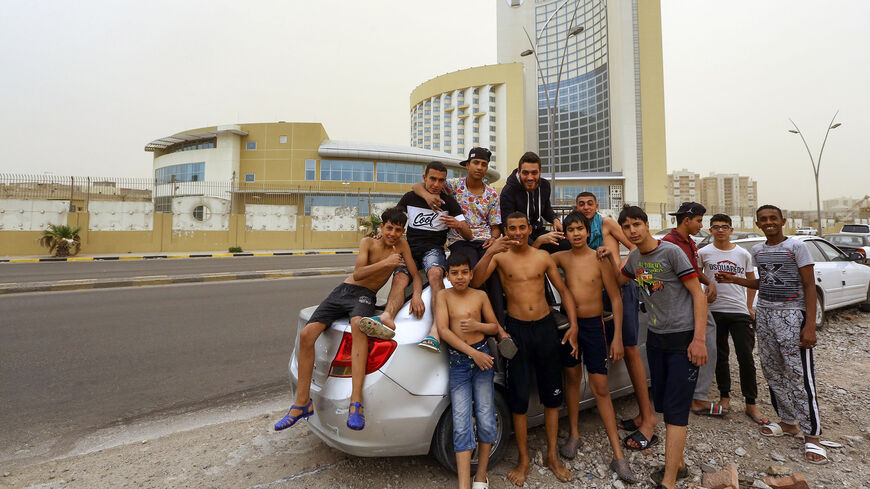MISRATA, Libya — As desperation continues to plague young Libyans in light of the decadelong cycle of chaos, impunity and violence haunting the country, many artists are showcasing their work that holds a message rejecting war.
“Chocolate Egg,” which is currently playing in Libya’s western city of Misrata, is a dark comedy play that sheds light on the officials’ exploitation of the Libyan youth who are part of armed formations that uses them in their political and financial games.
Playwright Abdel Wahhab Haddad told Al-Monitor that the idea behind his play came from military parades that are frequently seen in Libya. “I asked myself what happened behind the scenes to prepare for this military show? Who directed this parade? Who distributed the roles between the bit part players marching in formation like robots in front of the show’s main characters sitting on the podium with their medals and military uniforms?” he said.
“These parades seemed to me surreal, almost comical, despite the director’s attempts to make them look serious. It occurred to me that these parades are not randomly put together, but rather orchestrated by those producing them,” Haddad added.
Asked about the play’s name, he explained, “The original name of the play was 'Behind the Scenes.' But the director chose to name it 'Chocolate Egg' because of its recurrence throughout the play. 'Chocolate Egg' is used in the play to show the deceitful and frivolous method used to attract young men to take part in a military parade, which is one of the stories depicted in the play. The director is using the chocolate egg and the toy found inside the egg to point at the disdain and exploitation [of the leaders] on the one hand, and naivety [of the youth] on the other."
“We are not addressing the officials as we lost hope in them, but rather we are addressing the youth in an attempt to provoke them and have them look into a mirror to recognize the truth about their situation, and how they are being treated as gullible people who can be recruited and deceived through a toy found inside a chocolate egg," Haddad said.
“We sought to show the youth that they are puppets used in a wider show, who can be easily discarded and replaced once they are no longer fit for their role,” he added.
Libya has witnessed in the past two years relative security stability, although some politicians continue to pay militias to protect them.
Tripoli-based Prime Minister Abdul Hamid Dbeibah has reduced the demand for militia jobs, and became more popular by providing financial aid to families and newlyweds.
However, clashes last summer between militias close to Dbeibah and others allied with Libya’s rival Prime Minister Fathi Bashagha, who is based in Sirte in the east of the country, were a reminder that violence is not far off in Libya.
Ayoub Kadah, who is an actor in the play, spoke to Al-Monitor about his brother who was killed in the recent clashes. “I am trying to show people the truth. The play has a message that we do not want more wars. We’ve had enough of war. We want to enjoy the taste of life, not death,” he said. “Theater performances are affected by the situation in Libya, even when we reject [the situation]."
After more than a decade of chaos and war, Libyans are pleading for peace and making it clear that they have had enough of violence, he added.
Ali Obeid, another actor in the play, said he had many friends who embraced militia culture when they were teenagers, including some who dropped out of school to join the militias. “They recently started to feel ashamed of being fighters, because it has become taboo to have a fighter in the family. When they looked at others, they understood that they can succeed without having to be a fighter,” he told Al-Monitor.
To comprehend any culture or people, it is often said that one needs to understand their theatrical arts. The most successful theatrical performances at international festivals are mostly the ones that simulate the street; performances become a theater of struggle given the courage to depict the reality without any restrictions. The main obstacle remains the playwright, the one dramatizing reality on paper for an immersed director and an audience watching their own lives on stage, whether through black comedy or tragedy.
Director of "Chocolate Egg" Anwar Altair spoke to Al-Monitor about the play. “Our main goal is to promote and encourage theatrical practices, which can only be done through workshops and special courses for actors. When young people were offered the opportunity to join the play, they eagerly and happily came because there were no alternatives other than [joining] brigades or military formations,” he said.
Altair noted that as soon as an audition or workshop for a new play is announced, young people show up with enthusiasm that exceeds their enthusiasm for a new war project; so they give up their weapons and take to the stage.
He pointed out that reality is the main material used in theater and arts in general, and that most successful theatrical works are based on reality. “This is what we want to convey,” he added.
He explained that in Libya, reality and theater are one, saying that they often hear the sound of bullets and artillery while performing at the theater.
“Our only demand is to move toward peace, which has become a far-fetched dream in the presence of the corrupt individuals in power. The citizens only aspire to lead a life in peace," Altair said, commenting on the Libyans’ demands.





